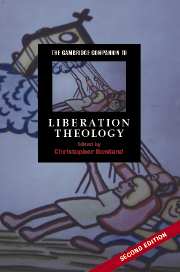Book contents
- Frontmatter
- Introduction: the theology of liberation
- Part I Contemporary Liberation Theology
- Part II Aspects of Liberation Theology
- Part III Analysis and Criticism
- 10 Liberation theology and the Roman Catholic Church
- 11 Marxism, liberation theology and the way of negation
- 12 The economics of liberation theology
- 13 Political theology, tradition and modernity
- 14 Globalising liberation theology: the American context, and coda
- Epilogue: the future of liberation theology
- Select bibliography
- Index
- Series list
12 - The economics of liberationtheology
from Part III - Analysis and Criticism
Published online by Cambridge University Press: 28 January 2008
- Frontmatter
- Introduction: the theology of liberation
- Part I Contemporary Liberation Theology
- Part II Aspects of Liberation Theology
- Part III Analysis and Criticism
- 10 Liberation theology and the Roman Catholic Church
- 11 Marxism, liberation theology and the way of negation
- 12 The economics of liberation theology
- 13 Political theology, tradition and modernity
- 14 Globalising liberation theology: the American context, and coda
- Epilogue: the future of liberation theology
- Select bibliography
- Index
- Series list
Summary
Introduction
Economics - in the general sense of the critical study of production,distribution and consumption of wealth in human society - is a central theme ofliberation theology. Although liberation theologians do not address the technicalquestions that constitute modern economic theory, they are concerned with thebroader issues of the way in which economic organisation relates to the historicalexperience of humanity in general and to the 'infinite value' of the poor to Godin particular. These issues of economic organisation and social justice aresimilar to the agenda of European political economy until the end of the lastcentury, and still central to debates on sustainable development strategies inpoor countries. But a concern for life itself as the criterion for judgingeconomic institutions can be considered to be a specific contribution fromliberation theology. Further, this theology is probably unique in being locatedwithin the broader context of debates in poor countries on the origins ofunderdevelopment and the condition of poverty - mainly but not exclusively inLatin America - which themselves have a major economic dimension. In consequence,the 'economics of liberation theology' has had a considerable impact beyond churchstructures, ranging from grassroots social movements throughout the developingworld to influential non-governmental organisations in industrialisedcountries.
The persistence of poverty in Latin America is morally unacceptable by anystandard. In 1980, after a period of rapid income growth before the debt crisis,and at the outset of the decade in which most liberation theology has beenwritten, 40 per cent of the population of the region were officially classified asliving in poverty, and nearly half of these in extreme poverty - that is withincomes insufficient to purchase the food required to meet the United Nations'minimum nutritional standard for a healthy life.
- Type
- Chapter
- Information
- The Cambridge Companion to Liberation Theology , pp. 248 - 264Publisher: Cambridge University PressPrint publication year: 2007
- 3
- Cited by

